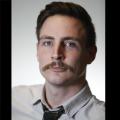Faringdon's most famous Spanish émigré, Arturo Barea, is to be honoured with an exhibition in Madrid this winter.
Oxford-born Madrid-based journalist William Chislett, who is curating the show, talks about its importance.
THE naming of a square in Madrid after Arturo Barea, the Spanish émigré writer and BBC broadcaster who lived on Lord Faringdon’s Buscot Park estate until his death in 1957, is to be followed by a major exhibition in Spain’s capital in December, which I am curating.
The memorial square, inaugurated in March by mayor of Madrid Manuela Carmena, came after I organised the restoration of Barea’s commemorative stone in the churchyard annexe to All Saints Church in Faringdon in 2010, and the placing of a plaque in 2013 on the façade of The Volunteer, Barea’s favourite pub.
The square revived interest in the writer, best known for his autobiographical trilogy The Forging of a Rebel, and led the Cervantes Institute, the Spanish cultural and language organisation named after the author of Don Quixote, to decide to mount an exhibition.
Barea's trilogy was first published in English in the 1940s, brilliantly translated by his Austrian wife Ilsa, and was not published in Spain until 1977, two years after the death of the dictator General Franco, the victor of the 1936-1939 Spanish Civil War.
Barea arrived in England just as the conflict was ending as he was on the losing Republican side.
The exhibition will showcase all his books, including Greek and Romanian editions of the trilogy, studies of the poet Federico García Lorca and the philosopher Miguel de Unamuno, Broken Root, his only novel, a very short story published in The Daily Express in 1937 and essays in Horizon, the most prestigious literary magazine of its day. Everything that Barea wrote was published in English before appearing in Spanish.
Barea never returned to Spain, but his large Underwood typewriter did, and it will be shown at the exhibition. Ilsa Barea gave it to David Vine, Faringdon’s dentist and a close friend of Barea’s, after Arturo died. It then passed through various hands and ended up being brought to Spain. Today, it has a place of honour in the home of a well-known Spanish novelist.
The exhibition will also focus on Barea’s broadcasting for the BBC Latin American Service. He gave 850 15-minute broadcasts between 1940 and his death. He was not allowed to work for the Spanish service as he was regarded as too compromised politically.
His talks on all aspects of British life were so popular that the BBC sent him on a two-month tour of several Latin American countries. When the Franco regime got wind of this, it tried to denigrate Barea by calling him Arturo Beria, in reference to Stalin’s state security chief. Barea was never a communist.
William Chislett is an Oxford-born, Madrid-based writer, who covered Spain’s 1975-78 transition to democracy for The Times.
His exhibition on Arturo Barea opens on December 13 at the Instituto Cervantes, Alcalá 49, 28014 Madrid, and will run for two months.
See cervantes.es








Comments: Our rules
We want our comments to be a lively and valuable part of our community - a place where readers can debate and engage with the most important local issues. The ability to comment on our stories is a privilege, not a right, however, and that privilege may be withdrawn if it is abused or misused.
Please report any comments that break our rules.
Read the rules here